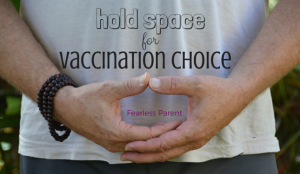In my last post, How the “Anti-Vaccine” Movement Threatens Us All, I discuss the vaccine debate as high drama, by design. Parents are playing into a polarized narrative that’s a lose-lose proposition for us and a home run for special interests. We may think it’s about vaccines. It’s really about parental rights and the role of government in our lives.
Welcome to the vaccine conflict as political theater.
What’s happening exactly? Look West, parents
To answer this question, set your GPS for Sacramento, California. There are three bills that tell the story in three acts, with some hard-earned lessons that apply to parents in all 50 states.
The final act is in our hands.
OVERTURE: QUIET COMPLACENCY
Before 2012, California represented the gold standard for vaccination choice and informed consent. Possessing of a very liberal philosophical exemption, the state added an explicit provision for a religious exemption, too. Things looked very good. A bastion of rationality, even.
All quiet on the western front.
ACT I: TESTING THE WATERS — ANYONE AWAKE?
In early 2012, a bill called AB2109 — positioned to address the transmission of communicable diseases — started moving. A debate started up about the role of vaccines and exemptions in controlling infectious diseases. The discussion was shut down before it was heard because our institutions of democracy aren’t working properly. The press is neither free nor balanced when it comes to many topics, including vaccination. In 2010, HHS Chief Kathleen Sebelius told the Reader’s Digest:
There are groups out there that insist that vaccines are responsible for a variety of problems despite all scientific evidence to the contrary. We have reached out to media outlets to try to get them to not give the views of these people equal weight in their reporting to what science has shown and continues to show about the safety of vaccines.
Parents now understand that bills like AB2109, which require that certain state-approved medical professionals sign off on our personal and deeply held religious or conscientious beliefs, are the first step in a very straightforward process that severely erodes parental rights. It starts with lobbyists and legislators placing a toe in the water to see what they can get away with.
Check out your own state to learn what’s percolating at home — there are nearly 100 bills in over 30 states seeking to:
▪ add new vaccine mandates for children and adults
▪ remove or weaken vaccine exemptions
▪ allow for child consent to certain vaccines and medications
▪ allow for vaccination without parental consent
▪ monitor compliance with mandates and publish exemptions
▪ implement default (as opposed to opt in) vaccination registries
▪ expand the ability of pharmacists and interns to administer vaccines
▪ increase the promotion of vaccination information.
Allowing bills like these to move without the strongest opposition possible on the part of everyone who cares about this issue is tantamount to sending an engraved invitation to have our rights removed. It signals a lack of will, understanding, and political engagement that feeds the beast. The only response that can shut this down is one that is unequivocal and sends legislators a crystal clear message that they will experience significant push-back.
ACT II: GOING FOR THE UNTHINKABLE — NO CHOICE
California’s AB2109 was signed into law on 9/30/12. It became effective on 1/1/14 and exemptions declined by 19%. The price of our failure to stop this bill? A shocking bill called SB277, which started moving very quickly. Despite zero connection between exemptions and the Disneyland measles cases, the media seized on the story and legislators fell in line. No permission! No exemptions! No mandated vaccines, no school!
The response was open-mouthed astonishment. Not in California! Thousands of people traveled to the state capital in determined and desperate opposition. The ACLU of California even got involved and wrote a compelling memo highlighting its concerns. It didn’t matter. Governor Brown signed SB277 into law on 6/30/15 and it became effective on 7/1/16. California joined West Virginia and Mississippi as one of three US states to eliminate the right to refuse vaccination for almost all children attending daycare and school.
Lest you breathe a sigh of relief that you don’t live in California and you’re not remotely fazed that an entire state has been wiped off the map as an option for your family, think again. California is the world’s sixth largest economy. SB277 establishes a kind of legislative and cultural precedent. This means that these kinds of laws are more likely to show up in your state. It also means that other institutions that are not explicitly compelled to follow SB277 — like colleges and summer camps and private athletic and academic programs — are more likely to follow suit anyway. As but one example, check out the University of California’s new vaccine exemption policy, updated 10/26/16.
How do you feel about narrowed college options for your children? How do you feel about homeschooling? Are you willing to keep moving? At what point do you finally turn around and say: “No more!”?
ACT III: THE ENDGAME — THE STATE vs PARENTS
What now? Isn’t SB277 enough? They won, right? Can we finally close the curtains on this horrible play in California? You’d think yes but the answer is no. There’s a new bill moving, called SB18, the Bill of Rights for Children and Youth in California. It tips their hand. As we’ve said, this issue isn’t really about vaccines, or California, or children even. It’s about the role of government in our families.
The state, as the ultimate uber-parent, is proposing that all children are entitled to:
- parents and guardians who act in their best interest
- healthy attachments with adults responsible for their care
- safe and healthy environment
- social and emotional well-being
- opportunities to attain optimal cognitive, physical, and social development
- appropriate, quality education leading to self-sufficiency in adulthood
- appropriate, quality health care
At first glance, who would oppose this? That’s precisely the point. They’re hoping people won’t take a closer look. But let’s you and I unpack this new bill. These statements are broad and sweeping. How do we define what’s best, optimal, healthy, appropriate, and high quality? Does it apply to all issues big and small? Who’s setting these state-sanctioned standards? The devil is in the details, after all.
- What if you believe that children need to experience the consequences of their actions and you allow your daughter to go hungry or get an F when she repeatedly forgets her lunch or homework?
- How about allowing your kids walk home from the park on their own?
- Maybe you turn your WiFi off at night because your son is struggling with limits around screen time, and he’s really mad at you?
- What if your tween has picked up a bit of bad language?
- How many acceptable ways are there to handle adolescent rebellion?
Who gets to decide? What’s the process for discussion and determination? What are the possible consequences?
- What if the state says you’re not educated enough to homeschool; doesn’t like the curriculum you use; or rules that the alternative school you’ve chosen isn’t optimal for your daughter’s cognitive development? Should the state choose your children’s school?
- How do you feel about home visitation programs designed to make you a more positive parent, including required coordination of referrals for community support? Should the state be able to impose therapy, counseling, and training?
- Will you submit to appropriate screening services including comprehensive medical history, blood tests, psych evals, and health education? Will you then agree to the prescribed dental, medical, and mental health services and treatments administered by qualified providers? Should the state choose your children’s doctors and treatments?
- What if your ideas of healthcare deviate from conventional “standard of care” and are deemed dangerous and tantamount to medical neglect? Should the state be permitted to veto alternative medical treatments and take away your children if you insist?
- Should the state evaluate whether you are maintaining a healthy work/life balance?
- Should the state pay for your child’s legal representation against you?
Do you really want to open the door to this kind of intrusion? Is it even possible to legislate good parenting? Should we find out?
What parents and activists need to know
There has never been a more important time to say “no more.” If we continue to lose exemptions across the country, one thing is certain — parent-driven activism focused on vaccine safety and parental rights will falter. We will be too busy moving and homeschooling and caring for increasingly sick children.
A FEDERAL VACCINE EXEMPTION IS A VERY BAD IDEA
States’ rights refer to political powers reserved for state governments. Under the Constitution, states have considerable autonomy to pass, enforce, and interpret their own laws and pursue their own policy programs. It’s another way that our founding fathers sought to slow things down and curtail federal powers as a protection against creeping authoritarianism.
Vaccine mandates are a state matter and should remain that way. If the feds have the jurisdiction to pass a bill we want (i.e., a universal personal belief exemption), it means they also have the jurisdiction to pass a bill we don’t want (i,e., universal vaccine mandates with no exemptions). Imagine that California’s SB277 is immediately and unilaterally enacted in all 50 states with the sweep of a single pen.
Don’t look for a shortcut here. States’ rights exist for a reason. State legislators are closer to the needs of the people they govern and are relatively more responsive to their constituents.
SHOW UP AND SHOW NUMBERS
Online education and support are very helpful but when it comes political advocacy, there’s no substitute for physical presence. Politicians pay attention to large crowds. The bigger the better. They seek applause and approval like flowers turn towards the sun. And nothing makes them run for cover than a disgruntled mob. Whisper “pitchforks” and they flee. Politicians are extremely risk averse — especially during an election year.
There’s a pretty simple formula, really:
- Gather in large numbers
- Deliver a clear message to state legislators
- Schedule a meeting
- Ask for what you want
This is what happened in New Jersey. Two months after 700 people rallied in Trenton, several of us met with the health commissioner and we procured this clarification letter about our exemption. The following year, Chris Christie reached out to us prior to the gubernatorial election and we obtained this campaign promise.
We’re all in this together. A large response in multiple states can catch fire and send state legislatures a resounding message that US parents don’t like what’s going down in California.
WE HAVE BIG ELECTIONS IN OUR NEAR FUTURE
Thirty-six governors will be elected in 2018. The composition of state legislatures may shift, creating opportunities and vulnerabilities. Reaching out to candidates now is a very good idea. They are in the mood to kiss babies and make promises. Take advantage of it.
New Jerseyans, take note. It has been nine years since our Trenton rally. We’re getting a new governor and the entire Assembly and Senate are up for re-election this November 2017. Primary Election Day is June 6.
Our exemption is not secure.
BEHIND THE SCENES ADVOCACY IS NOT ENOUGH
Engaging in behind the scenes advocacy with legislators to explain the issues can work but it’s high risk. It assumes that:
- We have entree with legislators and they are earnest in their willingness to listen with open minds and hearts.
- We are organized and have constituents who are willing and able to take action in all key legislative districts.
- We’ve done our homework. We know how each legislator will vote on our issue and who’s been receiving a lot of pharma funding.
- Legislators care about our votes. If there’s an election coming up, they’re more likely to pay attention.
- Legislators believe that we are a voting block and the advocates organizing these meetings are supported by large numbers.
- We’re monitoring bills closely and there’s enough time to act. Committees are supposed to give sufficient advance notice but chairpeople will sometimes find ways to evade the spirit of this disclosure, knowing how difficult it is for parents to drop everything and get childcare so we can show up.
PUBLIC PROTESTS IN DC OR AT CDC AREN’T CRITICAL PATH
Public protests in Atlanta (CDC headquarters) or Washington DC help raise awareness, particularly when they include meetings with experts and key personnel. It’s never a bad idea to build relationships and work to educate our leaders. But this isn’t the critical path.
- The key regulatory agencies have succumbed to bureaucratic capture. They have no mandate or incentive to engage with us.
- Our federal representatives are too far removed. Most will reasonably delegate this matter to state legislators (see discussion about states’ rights below).
- It is impractical to expect that sufficiently large numbers of parents can afford childcare and long distance travel.
I’m absolutely for collaboration across state lines. Let’s use our resources for grassroots organizing and make inroads protecting state exemptions. Successes at the state level will serve as a future springboard for large rallies in DC and elsewhere.
Let’s write our ending to this play
If you’re too busy to get involved or if you’re relying upon the efforts of others, it’s time to reconsider. How will your life change if you cannot get an exemption? Can you be sure that you will never want one in the future? This is an issue where you pay now by making the effort, or pay later by coping with the loss of your rights.
What will you do?
If this issue is important to you, network with other parents, support organizations that promote education and awareness, and attend their events. An engaged citizenry can form a bulwark to protect our rights and thwart these kinds of bills.
Photo credit: Hotel Providence
by Louise Kuo Habakus
© 2017 Fearless Parent
This post is copyright protected. If you wish to share, please obtain prior written permission with details for partial use and link back for attribution.














California has already broken the law by violating the Nuremberg Code. Do not further violate human rights and take away parents’ right to protect their children.
The Nuremberg Code is not law in the U.S., except where its language has been incorporated into state or fed statutes, which has happened in some small ways, so CA has not violated any law with respect to that Code. Technically, since vaccines administered in the US are all licensed by the FDA, legally, they are safe and effective. There are some state exemption statutes the clearly overstep Constitutional boundaries (whether or not CA’s new law does that has not yet been formally established), but the contradiction between these technical realities and the real harm vaccines cause is profound. So, clearly there is MUCH work to be done. While educating ourselves is a necessary prerequisite, that alone doesn’t stop the machine. The primary battleground is the state legislatures, as that is where rights are won and lost. The fed govt doesn’t have authority to mandate vaccines for state residents (they would have done so long ago if they did!), so the state legislatures is the primary, though not exclusive by any means, battleground. We MUST be active legislatively, and do so in a manner calculated to maximize our effectiveness. I do free conference calls with activists to discuss this! Vaccine Rights Attorney, Alan Phillips, J.D., attorney@vaccinerights.com
Thank you so much, Alan. This is important to clarify so we are precise in our comments. While the Nuremberg Code is not law in the US, it is “law” in our hearts. We know right from wrong. We know when our essential humanity and collective sense of decency and integrity are violated. We know that governments overreach and it is up to the people to set things right.
Excellent article!!! Thank you for writing and sharing!!!
I used to work for a chiropractor here in California. When SB277 was being pushed, i was surprised that he wasn’t more vocal against it as he had 2 small children.
He explained his lackadaisical attitude by saying that they used a pediatrician who would back up their choices, and his wife, a school teacher, was going to home school. I was amazed at his lack of concern over losing parental rights, but that was his response. His family moved out of state a few months after SB277 was enacted.
Still, as long as people tend to be apathetic about what our gov’t is doing, and take this lazy way of dealing with it (not unlike the “First they came for the Socialists, and I did not speak out—Because I was not a Socialist….” https://en.wikipedia.org/wiki/First_they_came_… ), we will continue to have our rights undermined until we live in a police state with no rights left.
This is so important for everyone to read. I think so many parents don’t think it’ll happen where they live because there are others staying on top of these issues for us. We all need to work together before it’s too late.
This is communism. My parents escaped a country that thought they knew what is best for you, you are too poor and stupid to be able to make any decisions about your welfare, and really you don’t matter – only the collective community matters. If you need “more” or “less” or “different” oh well, you as an individual didn’t matter anyway. They ESCAPED that life where they were told what jobs they can have, where they can live, what they are allowed to buy and when; govt controlled media, etc. How in the world is it even possible that in the United States of America, nation regarded for our freedoms, we have allowed ourselves to believe it is OK for the government to make such personal decisions FOR us?! Mandate medical procedures/pharmaceutical products? Sort of on the same lines as the ACA mandate (why should I be forced to buy this if I don’t want it?). But this is even worse, because it is a physical invasion. Science moves at the speed of light, and new discoveries are made every day ; where is the guarantee that the law will move at the same speed? Medicine and standards of care are very slow to catch up with science, as new information usually doesn’t incorporate into mainstream for up to 10 years typically. So these morons in politics think it’s OK to mandate something today that could change tomorrow? And what happens when there are recalls or contamination or any number of things affecting its safety. Do we have the right to “break the law” to protect our children from a contaminated product, or are we still mandated to inject our children with potentially lethal substances? And again, circling back to my first point – today is vaccines. What will it be tomorrow? Will they mandate adhd meds to all children? Will they mandate all people over 50 must be on blood pressure and cholesterol meds whether they need them or not? Will they mandate abortions for women who already have 2 children? Will we be forced into medical experiments for “the greater good”?
I live in West Virginia. When I post about vaccine exemptions, all I hear is, “You can homeschool your children. We don’t want infection in our schools.” Beyond the idiocy of those statements, they have no recognition that, someday, THEY may wish to opt out of a mandated vaccine. No understanding that the state could add any they wanted to the schedule without the ongoing advocacy for our rights. Most people have NO idea many vaccines are even on the current schedule, nor do they care. One day, if the state continues to push, they will care.
We are living in times of epic change. Which way it will go depends on us. Waking up is not easy, given that we have been force fed corruption and lies for so many decades. We are now engaged in what I call the “epigenetic repercussion” of these manipulations. In the 1960s we still had a press that focused on what was actually happening. We no longer have unbought media. We have to work smarter and better. The activism of the past alone will not take us to where we need to go. We need a new activism coupled with what has worked before. There’s no roadmap for this but we are creating the new landscape as we become aware and even more awake. Thank you Louise Kuo Habakus
Well written article
Gosh I love Louise Kuo Habakus ❤️
http://www.parentalrights.org
I think this leads to part 2 but links to part one, might help in Australia???
Did you see the media covering – for more than a minute – the thousands of people who protested in Sacramento? No.
Yes, put Government back in its place.
Unfortunately I think CA is a lost cause.
And this is the standard – Pan went to NYC to speak to medical students. He’s the new Offit.